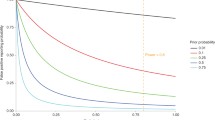Abstract
The goal of every author is to have their research work published. In the process of publishing a peer-reviewed article, authors are often required to revise their original manuscript based on the comments from the reviewers. Although some of these comments are straightforward and concise, others are conflicting and unclear and, as such, authors may find it challenging to plan and carry out the revision as well as compose the accompanying response letter. In this article I outline eight challenges in handling reviewers’ comments that may be useful for novice authors. In general, authors will always benefit from adopting a positive attitude towards reviewers’ comments and make the effort to improve their manuscript.
Graphical abstract


Similar content being viewed by others
References
Scholz F (2022) Writing and publishing a scientific paper. ChemTexts 8:8. https://doi.org/10.1007/s40828-022-00160-7
McGrail MR, Rickard CM, Jones R (2006) Publish or perish: a systematic review of interventions to increase academic publication rates. High Educ Res Dev 25:19–35. https://doi.org/10.1080/07294360500453053
Johnston J, Wilson S, Rix E, Pit SW (2014) Publish or perish: strategies to help rural early career researchers increase publication output. Rural Remote Health 14:372–377
Kelly J, Sadeghieh T, Adeli K (2014) Peer review in scientific publications: benefits, critiques, and a survival guide. EJIFCC 25:227–243
Annesley TM (2011) Top 10 tips for responding to reviewer and editor comments. Clin Chem 57:551–554
Gabbaï FP, Chirik PJ (2018) Dos and don’ts: thoughts on how to respond to reviewer comments. Organometallics 37:2655
Ensom MHH (2011) Improving the chances of manuscript acceptance: how to address peer reviewers’ comments. Can J Hosp Pharm 64:389–391
Nahata MC, Sorkin EM (2019) Responding to manuscript reviewer and editor comments. Ann Pharmacother 53:959–961
Hiemstra PS (2018) How to write a response to the reviewers of your manuscript. Breathe 14:319–321
Hunt MJ, Ochmanska M, Cilulko-Dolega J (2019) How to write an effective response letter to reviewers. Med Sci Pulse 13:60–63
Silbiger NJ, Stubler AD (2019) Unprofessional peer reviews disproportionately harm underrepresented groups in STEM. PeerJ 7:e8247. https://doi.org/10.7717/peerj.8247
Curran-Everett D (2017) The thrill of the paper, the agony of the review. Adv Physiol Educ 41:338–340. https://doi.org/10.1152/advan.00069.2017
Mavrogenis AF, Quaile A, Scarlat MM (2020) The good, the bad and the rude peer-review. Int Orthop 44:413–415
Hites RA (2021) How to convince an editor to accept your paper quickly. Sci Total Environ 798:149243. https://doi.org/10.1016/j.scitotenv.2021.149243
Johnson SH (1996) Dealing with conflicting reviewers’ comments. Nurse Author Ed 6:1–3. https://doi.org/10.1111/j.1750-4910.1996.tb00365.x
Adib S, Nimehchisalem V (2021) Reasons for manuscript rejection at internal and peer-review stages. Int J Educ Lit Stud 9:2–8
Kim SD, Petru M, Gielecki J, Loukas M (2019) Causes of manuscript rejection and how to handle a rejected manuscript. In: Shoja M, Arynchyna A, Loukas M, D'Antoni AV, Buerger SM, Karl M et al (eds) A guide to the scientific career. Hoboken, Wiley, pp 419–422
Ware M (2008) Peer review: benefits, perceptions and alternatives. Citeseer. http://citeseerx.ist.psu.edu/viewdoc/download?doi=10.1.1.214.9676&rep=rep1&type=pdf. Accessed 17 May 2022
Ralph P (2016) Practical suggestions for improving scholarly peer review quality and reducing cycle times. Commun Assoc Inf Syst 38:13
Rasmussen SC (2020) Peer review-critical feedback or necessary evil? Substantia 4:5–6
Agarwal R (2013) Editorial notes. Inf Syst Res 24:1–2. https://doi.org/10.1287/isre.2013.0476
Street C, Ward KW (2019) Cognitive bias in the peer review process: understanding a source of friction between reviewers and researchers. ACM SIGMIS Database Adv Inf Syst 50:52–70
Barroga E (2020) Innovative strategies for peer review. J Korean Med Sci 35:e138–e138. https://doi.org/10.3346/jkms.2020.35.e138
Author information
Authors and Affiliations
Corresponding author
Additional information
Publisher's Note
Springer Nature remains neutral with regard to jurisdictional claims in published maps and institutional affiliations.
Rights and permissions
About this article
Cite this article
Balan, S. Responding to reviewers’ comments: tips on handling challenging comments. ChemTexts 8, 16 (2022). https://doi.org/10.1007/s40828-022-00167-0
Received:
Accepted:
Published:
DOI: https://doi.org/10.1007/s40828-022-00167-0




